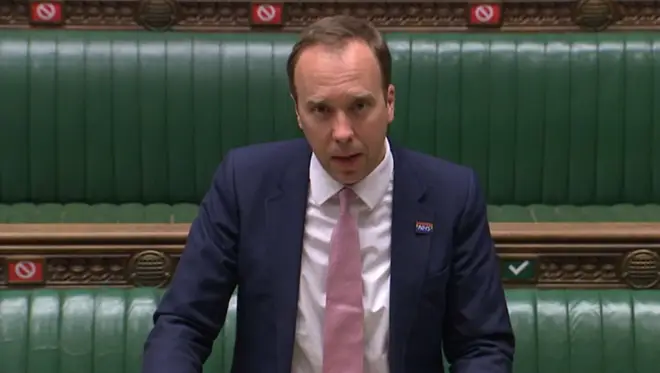
Paul Brand 7am - 10am
14 July 2020, 14:56

Health Secretary Matt Hancock has said an announcement will be made on Thursday on possible changes to the local lockdown in Leicester.
Mr Hancock was asked by Shadow health secretary Jonathan Ashworth asked about the Leicester lockdown and what metrics would be used to judge whether the city could ease the measures.
Mr Hancock said that fourteen days of data will be looked at in order to make any decision about the situation in Leicester.
Two weeks ago Health Secretary announced Leicester would be the first city to be put under a local lockdown due to a spike in coronavirus cases in the area.
The city is waiting to hear this week if it will be released from tighter restrictions or if they will continue for at least a further fortnight.
On the possibility of extra support for Leicester businesses, Mr Ashworth asked: "When people are worried about their jobs, this mixed messaging is the last thing they need.
"Will he instruct the HSE to inspect all factories, all meat-packing plants, all distribution centres and all large employment sites as a matter of urgency? On testing, local authorities still need specific data that can facilitate action."
Matt Hancock responded: "We will look at fourteen days of data as it is today fourteen days since the measures were introduced and we'll look at that on Thursday of this week and make a public announcement as soon as is reasonably possible about whether and any changes can be made to the situation in Leicester.

Boris Johnson denies "lost week" in responding Leicester spike
"Thankfully the numbers have been coming down in Leicester and we've put in that extra testing but the number of positive tests in Leicester is still well above the rest of the country and I will not pre-judge the decision that we are going to make on Thursday and we'll take into account all of the data against the specific metrics.
"We won't set out specific thresholds, instead we'll look at all of the data, both the level and the rate of change and make the appropriate decision in consultation with the local authority."
However, one of the Government's deputy chief medical officers has said previously any decision to lift Leicester's lockdown "can't be rushed" and will depend on coronavirus disease rates falling to levels comparable with other areas/
Professor Jonathan Van-Tam said a lockdown exit plan for the city depends on value judgments by public health professionals on when Covid-19 rates are "consistently and obviously" falling.
Mr Van-Tam said that data published on Saturday showed the city is "really quite an outlier" compared with anywhere else in the country.
The latest figures for Leicester show a seven-day rate of 126 cases per 100,000 people, compared with figures of 17.8 for Leicestershire as a whole, 9.3 in Derby and 5.4 in Nottingham.

Why were the govt so slow to react to Leicester's Covid-19 outbreak?
Earlier on Tuesday, local NHS officials said the coronavirus outbreak and lockdown in Leicester had highlighted the need to tackle health inequalities.
Issues around deprivation, ethnicity and numbers of people registered with GPs were raised at a meeting of the Leicester, Leicestershire and Rutland Clinical Commissioning Groups (LLR CCGs) governing body.
Prof Azhar Farooqi, clinical chair of the Leicester City CCG, said the recent local "spike" of Covid-19 had triggered an "extraordinary" response from the NHS during a "tough time".
He added: "One of the learnings... from this lockdown is really the impact of deprivation and ethnicity on health inequalities.
"I think as a CCG this has really brought to us a focus around the barriers... social, cultural and language to accessing health, and the impact of health beliefs."
Prof Mayur Lakhani, clinical chair of the West Leicestershire CCG, said the health inequality agenda was "very, very key", adding that "racial inequalities" were "notable" in the wider CCGs' area.
Andy Williams, LLR CCGs chief executive, said: "Once again we see the impact of illness, in this instance Covid-19, impacting asymmetrically on our population".
He explained that there were "structural in-built inequalities" in general society which meant disease impacts "asymmetrically the poorest or most disadvantaged".
A report by Mr Williams presented to the meeting called for a "big conversation" between local statutory and public sector bodies as part of a bid to reduce health inequalities.
He labelled it as one of the "most persistent and stubbornly difficult" issues in society which "remains in strategic health terms probably the key challenge".
Prof Farooqi acknowledged that Leicester's lockdown had caused a "delayed recovery to a degree, certainly in primary care" and said efforts were needed to ensure the city was not left behind.
Meanwhile, Zuffar Haq, an independent lay member of the Leicester City CCG, said he was "shocked at the number of patients that don't have a GP registered in the city".